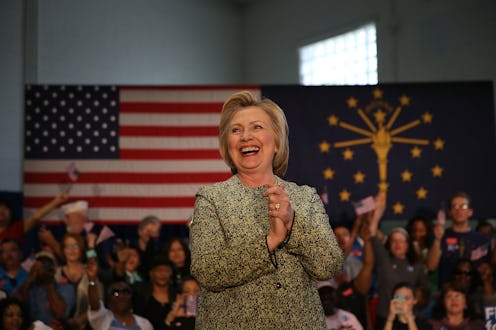News
How Many Delegates Did Hillary Take In Indiana?
Happy primary night! The presidential race continues to march on, with neither the Republican nor Democratic field narrowing to one. Despite frontrunners Hillary Clinton and Donald Trump having held durable leads for months now, their rivals have been campaigning hard (up until Ted Cruz dropped out on Tuesday). And on the Democratic side, that was borne out by a Bernie Sanders victory in the Hoosier State. So how many delegates did Hillary Clinton win in Indiana?
Make no mistake: Despite losing Indiana, Clinton finished Tuesday in a much stronger position than Trump was on the Republican side. While he still faces a possible contested convention, Clinton's lead of more than 300 pledged delegates (combined with the Democratic superdelegates, who always end up supporting the candidate who leads in pledged delegates) has made the outcome of the Democratic race a foregone conclusion. And her narrow loss in Indiana doesn't drastically change that reality, because the Democratic primaries all allocate delegates in proportion to the vote. Only big, overwhelming wins really move the needle, in other words, and there are perilously few realistic means for Sanders to fill the gap.
So that all said, how'd Clinton fare Tuesday night? At the time of this writing, with 98 percent of precincts reporting, she lost Indiana to Sanders by about six points, and has claimed at least 37 delegates to Sanders' 43. That leaves just three of the state's 83 delegates still outstanding. The final tally will be updated as the last results roll in.
Regardless, it's still a virtually impossible road for Sanders from here on out. But the Indiana win does give him some positive attention going forward. And that matters, because he seems intent on playing the race out to the very end ― he's repeatedly stressed that he plans for his campaign to go all the way to the Democratic National Convention in July, and said this week that it'll be a "contested" convention. That's somewhat wishful thinking, unless he manages to seize a lead in the pledged delegate count. But his long-term commitment to stay in the race is very clear, even as the delegate math doesn't add up.
